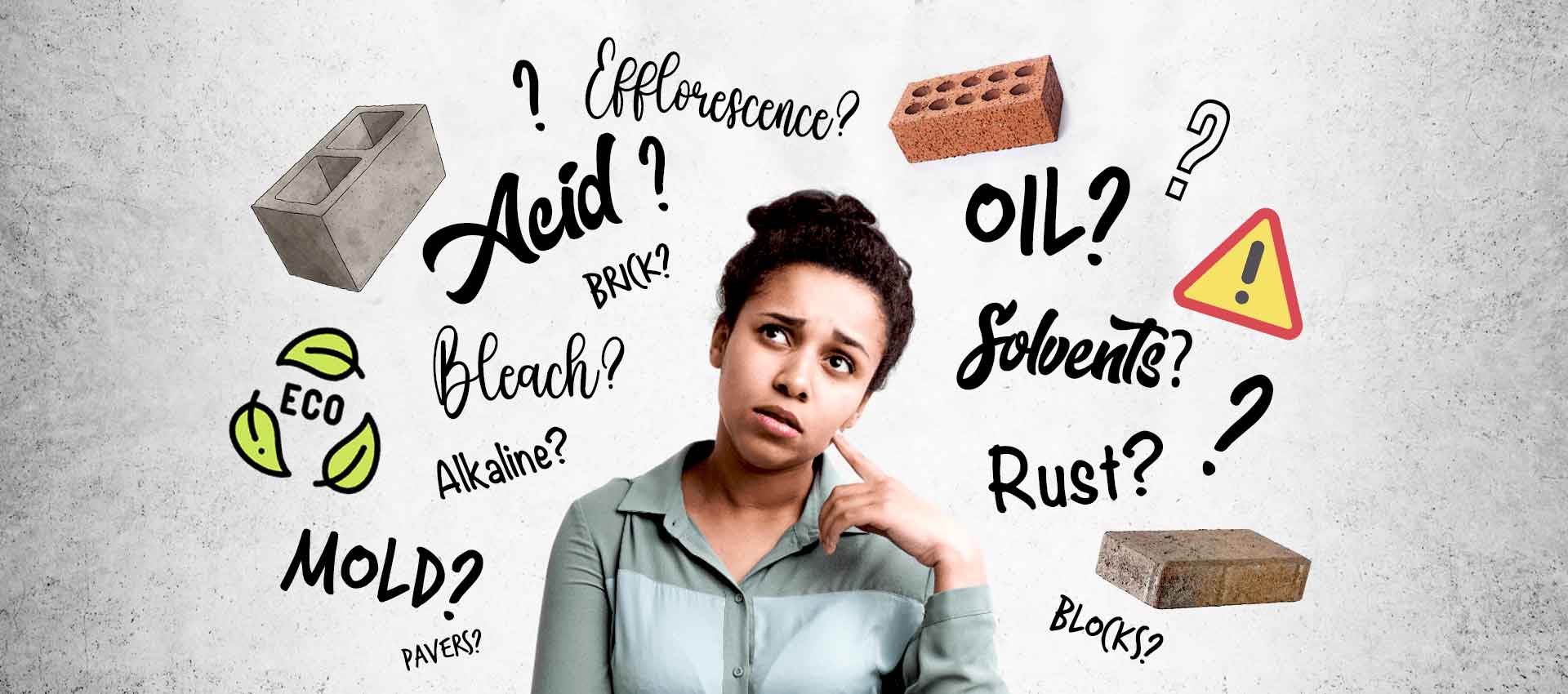What You Need to Know About Concrete Cleaners
Frustrated by unsightly stains on your concrete driveway or garage floor? Patio collecting more grime than compliments? When it comes to keeping your concrete surfaces looking good, choosing the best concrete cleaner for the job is crucial. With so many options available, it can be difficult to know where to start. This comprehensive guide will cover what you need to know to make the right choice. Whether you’re looking for a concrete driveway cleaner, patio cleaner, or your’re prepping your concrete floor for a sealer, stain, or coating, we’ve got you covered. So grab your bucket, and let’s get to work!
*If you are cleaning brick and mortar, check out of Brick Cleaning Guide
Factors to Consider When Choosing a Concrete Cleaner
It’s time to get serious about cleaning concrete surfaces. And while it may seem like a simple task, choosing the right cleaner can be a tricky business. When choosing a concrete cleaner, or any cleaner for that matter, there are several factors that you should consider to ensure that you get the best results. These factors include:
- Type of Stain: Different types of stains can be difficult to remove, but with the right cleaner, you’ll be amazed at what you can accomplish. Stains from oil, grease, and other automotive fluids, for example, require a degreaser to break down the grease and lift it off the surface. Rust stains, on the other hand, require a rust remover specifically designed to dissolve and remove rust. And let’s not forget about stubborn organic stains, like algae, mildew, and mold – for these, you’ll want a cleaner with an appropriate biocide to effectively remove the stain. So, before choosing a cleaner, it’s important to identify the type of stain you’re dealing with to ensure the best results.
- Surface Type: Concrete and brick surfaces come in many shapes and sizes, from concrete driveways and patios, to brick walls and fireplaces. It’s important to choose a cleaner that is designed for the type of surface you’re cleaning, as some cleaners can be too harsh for certain surfaces, leading to damage or discoloration. For example, some concrete floor cleaners may be too strong for use on delicate brick surfaces. So, make sure to select a cleaner that is appropriate for the type of surface you’re cleaning, and always read the manufacturer’s instructions before use.
- Strength: When it comes to cleaning concrete and brick surfaces, strength matters. Some cleaners are designed to be stronger than others, so it’s important to choose a cleaner that is appropriate for the type of stain you’re dealing with. If you’re dealing with tough, stubborn stains, you’ll want to choose a cleaner that is specifically designed to tackle those types of stains. And if you’re dealing with lighter, surface-level stains, a milder cleaner may be all you need. So, make sure to select a cleaner that is appropriate for the level of stain you’re dealing with to ensure the best results.
- Environmental impact: it’s important to consider the environmental impact of the products we use. Some cleaners contain chemicals that can be harmful to the environment and human health, so it’s important to choose a cleaner that is environmentally friendly. Look for cleaners that are biodegradable, and free from harsh chemicals. Not only will you be doing your part for the environment, but you’ll also be making a cleaner, healthier space for you and your family. And who doesn’t want that?
Common Types of Concrete Cleaners
When it comes to cleaning concrete and brick surfaces, choosing the right type of cleaner is crucial. There are several types of concrete cleaners available, each specifically designed to tackle specific types of stains. Understanding the different types of concrete cleaners is essential to making an informed decision and achieving the desired cleaning results.
- Acid-Based Cleaners: Acid cleaners work by removing a thin layer from the concrete’s surface. This makes them particularly effective at removing surface-level stains. Traditional acid-based cleaners use muriatic acid or phosphoric acid and are applied directly to the stain. When an acid is applied to concrete, it reacts with both calcium hydroxide and calcium carbonate found naturally in concrete. While this reaction can help to remove stains and contaminants, if acid washing is too frequent or your acid is too strong, it can damage your concrete, brick, or pavers. Polished surfaces and colored concrete should not be treated with acid, as it would likely etch the surface or make the color dull. It’s important to note that both muriatic and phosphoric acid can be harmful if not used properly and should be used with caution.
*PRO-TIP* – Look for the next generation of low-pH cleaners that do not use acid – stronger than old-school muriatic acid but safe for use indoors.
- Alkaline Cleaners: Alkaline cleaners are a type of concrete cleaner designed to to remove tough, deeply ingrained stains for concrete, pavers, and brick. They work by using a high pH solution to dissolve and lift stains, breaking down the bond between the stain and the surface. Alkaline cleaners are typically, composed of a combination of sodium hydroxide, surfactants, and water, and are applied directly to the stain. The alkaline solution reacts with the stain, breaking it down and allowing it to be rinsed away with water. Alkaline cleaners are especially effective for removing oil and grease stains, and are commonly marketed as concrete degreasers. They are often used as a pre-treatment for surfaces that are being cleaned with a pressure washer, as the high pH solution helps to loosen and remove dirt, grime, and other debris.
- Solvent-Based Cleaners: Solvent-based concrete cleaners utilize various types of solvents to dissolve and remove stubborn stains and buildups from concrete surfaces. Solvents work on a wide variety of stains including paint, graffiti, adhesives, mastic, and topical concrete sealers. However, due to the strong chemical composition of some solvent-based cleaners, they should be used with caution and only in well-ventilated areas. Some solvents can be harmful to the environment and to human health if not handled and used properly. Fortunately, there are safer solvent-based cleaners available.
- Detergents: Detergent-based concrete cleaners are a type of cleaner that utilize a soap or detergent solution to remove dirt and grime from concrete surfaces. These cleaners work by breaking down and lifting away dirt and grime from the surface of the concrete, making it easier to rinse away with water. Detergent-based cleaners are typically less harsh and more environmentally friendly than other types of concrete cleaners, making them a popular choice. They work best on concrete surfaces that have not been severely stained or have a buildup of tough substances, such as oil or grease.
Pros and Cons of Different Concrete Cleaners
Acid-based cleaners:
Pros:
- Great for efflorescence, rust, lime run, and mineral stains
- Can brighten surfaces making them look like new
- Great prep for a penetrating concrete sealer
Cons:
- Can damage concrete surfaces
- Harmful to the environment and human health
- Muriatic & Phosphoric cleaners are not for indoor use
Alkaline cleaners:
Pros:
- Gentle and effective for removing grease and oil stains
- Safe for the environment and human health
Cons:
- May not be effective for removing stubborn stains
- Can leave a residue if not rinsed thoroughly
Solvent-based cleaners:
Pros:
- Effective for removing a wide range of stains
- Can dissolve and remove paint, adhesives, and more
- Fast acting and free rinsing
Cons:
- Most solvent cleaners are flammable and toxic. Special precautions must be taken to avoid fire and exposure.
- Some solvents are not suitable for indoor concrete cleaning.
Detergent-based cleaners:
Pros:
- Suitable for general cleaning and removing dirt and grime
- Safe for the environment and human health
Cons:
- May not be effective for removing stubborn stains
- Can leave a residue if not rinsed thoroughly
-
Cleaning Concrete, Bricks, & Pavers the Right Way
- When it comes to cleaning concrete, brick, and masonry surfaces, RadonSeal has the top-performing products for all types of stains and surfaces. Safer, more effective, and less expensive than other products on the market. Whether you’re dealing with grease stains, rust stains, efflorescence, or any other type of stain, RadonSeal has a cleaner that will get the job done. Let’s face it, cleaning concrete can be a real pain. But with RadonSeal, it doesn’t have to be. So why waste your time and money on products that don’t work? Get the job done right the first time!
-
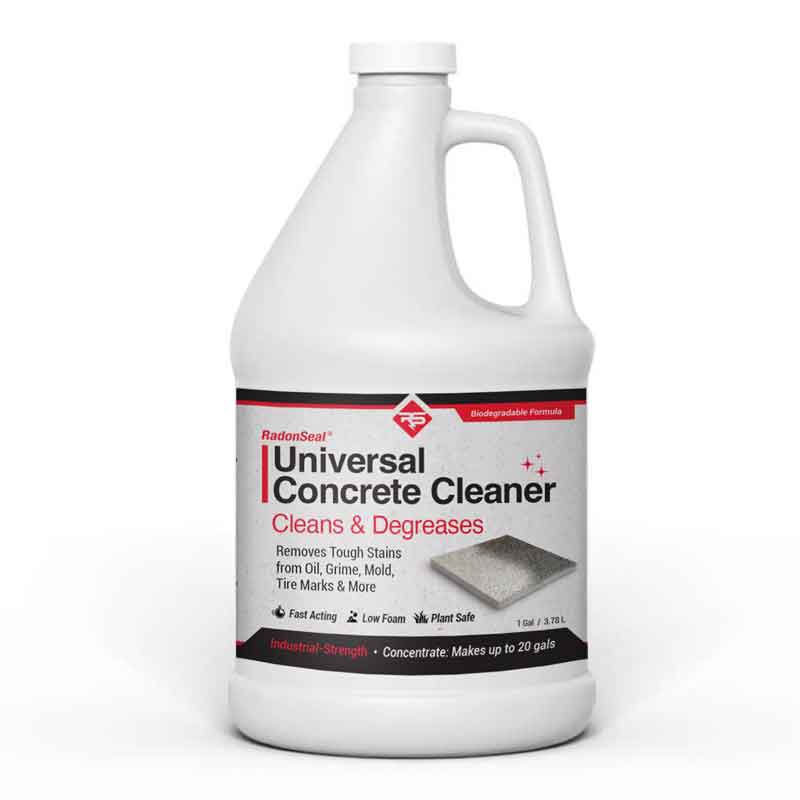
Universal
Concrete Cleaner & Degreaser
High-Performance
Concentrated cleaner & degreaser in one. Incredibly versatile. Dilute with water to match the job.
Earth-Friendly
Non-toxic. Non-corrosive. Non-flammable. 100% Biodegradable.
Industrial-Strength
Removes grime, oil, grease, tire marks, leaf stains, molds and algae stains, flooring adhesives, even latex paint.
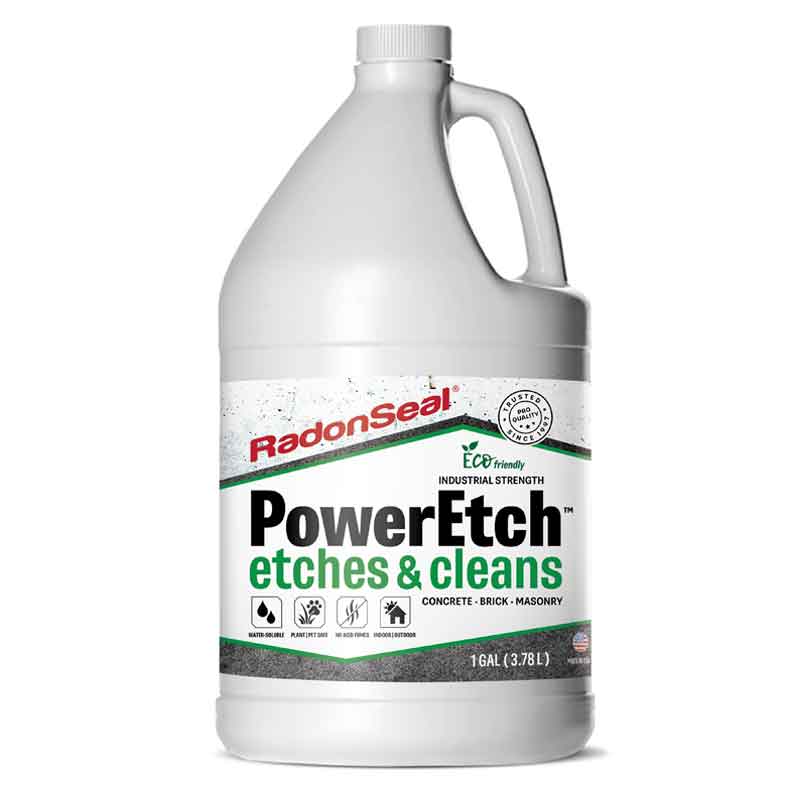
PowerEtch
Etcher & Cleaner
Commercial-Grade
Powerful etching solution for profiling concrete. Use before painting, sealing, or staining smooth floors.
Deep Cleans
Removes stubborn efflorescence, lime run, mortar, red clay, and rust stains.
User-Friendly
Non-corrosive to skin. No choking acid fumes. Will not “burn” concrete. Safe for indoor or outdoor use.
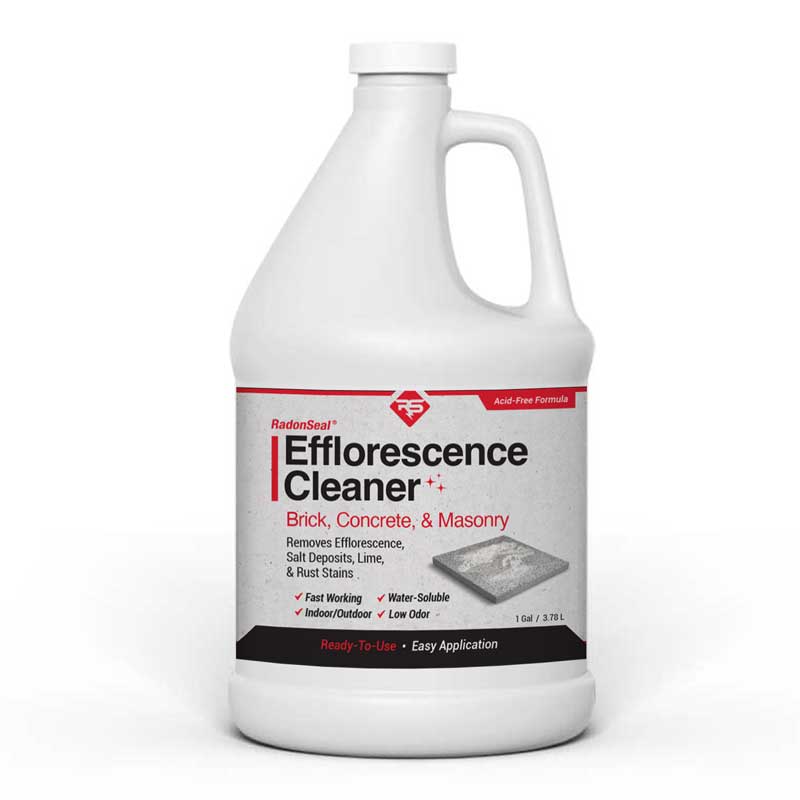
RadonSeal
Efflorescence Cleaner
Deep Cleans
Removes efflorescence staining, mineral stains, lime deposits, rust, and hard water stains.
No Harsh Acids
Does not contain phosphoric, muriatic, or hydrochloric acids. No bleach or petroleum distillates.
User-Friendly
Safe for indoor use. Acid-free formula. Low odor. Not corrosive to skin.
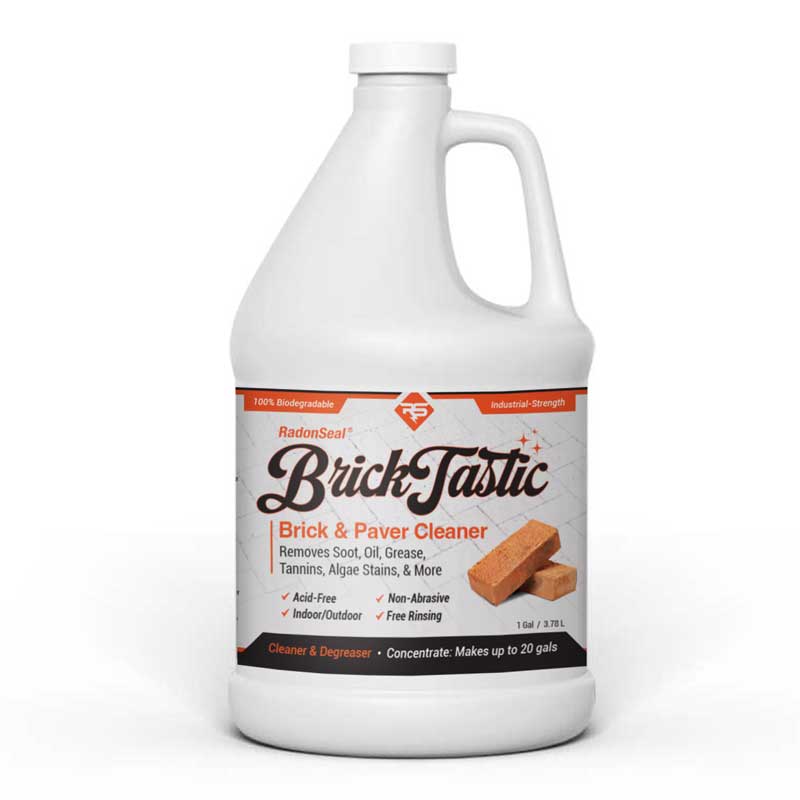
BrickTastic
Brick & Paver Cleaner
Industrial-Strength
Concentrated cleaner & degreaser in one. Incredibly versatile. Dilute with water to match the job.
Indoor/Outdoor
Powerful yet safe. 100% biodegradable. Low odor. People, plant, & pet safe Ideal for indoor use.
All-In-One Cleaner
Removes grime, oil, grease, soot, creosote, tire marks, leaf stains, molds and algae stains.
